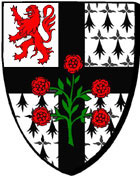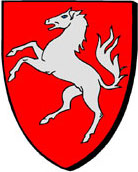
Encyclopédie Marikavel-Jean-Claude-EVEN/Encyclopaedia/Enciclopedia/Enzyklopädie/egkuklopaideia
 |
|||

England Bro-Saoz |
Richborough Rutupiae / Ritupis |

Kent Bro-Gent |
| pajenn bet digoret e 2001 | page ouverte en 2001 |
* forum du site Marikavel : Academia Celtica |
dernière mise à jour 04/06/2025 14:14:54 |
![]()
|
Définition/ Displegadur : Ville d'Angleterre; comte de Kent. Ancien camp romain de Rutupis / Rutupiae
|
|
![]()
|
i
Extrait d'Ordnance Survey : Map of Roman Britain |
![]()
|
Histoire/ Istor : Place forte de toute première importance à l'entrée de l'île de Bretagne, sur le Fretum Gallicum / Pas-de-Calais / Strait of Dover. Premier camp légionnaire romain de Bretagne lors du débarquement de 43, sous Aulus Plautius, pour le compte de l'empereur Claude. Quartier général de la Legio II Augusta à partir d'Hadrien. A la fin du IIIè siècle, son commandant reçoit la fonction et le titre de Comte de la Côte Saxonne. Rutupiae / Richborough constitue le point de départ sud-est de la grande route romaine diagonale appelée Watling Street, reliant Rutupiae / Richbourough, Durovernum / Canterbury, Londinium / Londres, pour finir à Deva / Chester.
***** La Notitia Dignitatum nous confirme sur le commandement jusqu'à la fin du IVè et début du Vè siècles : Praefectus legionis Secundae Augustae = Préfet de la Deuxième Légion Impériale. ***** Ce qui reste des troupes impériales romaines évacuent et abandonnent définitivement Ritupis / Richborough en 418 (Anglo-saxon Chronicle). *****
La "croix" visible au milieu du site correspond à l'embase de la statue monumentale, disparue, de l'empereur Domitien, élevée à cet endroit après la victoire romaine des Romains contre les Calédoniens (Écosse actuelle), pour signifier l'achèvement de la main-mise de Rome suer l'Île de Bretagne ******* En 449, pour faire face au danger des Pictes et des Scots sur les frontières du nord et de la Mer d'Irlande, le dux de Bretagne, Vortigern, fait appel à des mercenaires Jutes, venant de l'actuel Danemark. Après leur victoire commune, Vortigern offre à ses allies de s'installer dans l'île de Thanet, au sud-est du Kent. Mais dès 455 s'élève une querelle entre les anciens alliés, querelle qui aboutit à une bataille à Aylesford. Les Britto-romains sont vainqueurs dans la bataille, mais tombent naïvement dans le piège tendu par Hengist, le chef Jute, qui en fait massacrer plus de deux cent, selon les chroniques. Les Jutes s'emparent alors d'une partie du Kent, dont Canterbury, Richborough et Douvres. Le lieu de la bataille, à Aylesford, laisse à penser qu'ils auraient évité d'attaquer une place forte telle que celle de Durobrivae / Rochester. |
![]()
|
Étymologie / Gerdarzh * ALF.Rivet & C.Smith : - Ptolemee : Routoupiai, Ptol; ( = Rutupiae), - AI 4634; 4665 : Ritupis, AI 4726; Ritupium, - IM 4964; Ritupium, - Ravenna, 10636 Rutupis, - TP : Ratupis; - ND, XXVIII9; Rutupis; Rittupis. - Ammien Marcellin, Xx,I,3; XXVII,8,6 : Rutupias, - Orose : Rutupi Portus, Ruthubi, Rutubi, As an elegant variation on Britannicus, an adjective Rutupinus was used by the Latin poets : Lucan Pharsalia vi, 67 : Rutupinaque litora; Juvenal iv, 141: Rutupino. . .fundo (vars. Ruptupino, Ritupino); Ausonius Parentalia vii, 2 : tellus. . . Rutupina; Parentalia xviii,8 : Rutupinus ager ; and Ordo Nobilium Urbium vii, 9 : Rutupinum.. .latronem. Wc give the namc in nominative plural form, following Ptolemy, because it is clear that in the usage of literary Latin writers it was declinable (Ammianus) ; but it is also clear that in ordinary usage (reflected in AI, Ravenna, TP and ND) the name had settled like many others into a locative-ablative plural in -is, no longer declinable. E. P. Hamp in BBCS, xxvi (1974-76), 395-98, wishes to see behind each of the main recorded forms a Latin version of a different British morphological formation, in terms of number and case. The resuit is elegant and convincing, but it would seem to imply that Ammianus and Orosius, for example, had first-hand information from contemporary British-speaking informants and were simply latinising the results anew. This can hardly have been so; the name was well establishcd in Latin usage and was wcll known, as that of the main port of entry. Alone among literary men after Ptolemy, Ammianus gave it a full declensional form. Orosius's Rutupi Portus is best explained as a mildly unsatisfactory form within Latin, rather than as a genuine singular which represents a hitherto unrecorded and meaningful syntactical formation (after all, it requires only loss of one letter from AI's Ritupis to produce this, and is surely the simplest explanation). DERIVATION. It is clear that the best form is Rutupiae, Rutupis; the scansion in Latin verse was Rutupinus, whose long î leads Jackson to think that the British name was *Rutupia or plural *Rutupias, rather than *Rutupia-s. The Latin verse scansion could be artificial or conventional, as the meaning certainly is; however, the first two short vowels suit Hamp's view that the British name was *Rutupiias (nominative plural). If the name properly has Ru-, as is clear, AI's forms in diverse itinera which regularly have Ri- are probably due to an assimilation to the more familiar Celtic word *ritu- ' ford ' ; and *ritu- was in fact taken as the etymon by Zachrisson (1927) 81- 82, which must be dismissed on various grounds. For further discussion of the recorded forms, with confirmation of initial Rutu-, see the study of Hamp mentioned above. The name has been thought a dirficult one. There is a possible analogue in Rutuba mentioned by Pliny NH III, 48, a river of N. Italy near the present French border; there is another Rutubis, a port of Mauretania (Pliny NH II, 9), which then suggests that both correspond to an old Mediterranean level of naming; but in another study in EC, xi (1966-67), 413-14, Hamp took the N. Italian Rutuba to be Gaulish and hence equivalent to the British name. Williams associated initial Rut- with Welsh rhwd, now meaning 'rust' but earlier 'filth' in general, which R&C then applied as meaning 'mud-flats, muddy creek(s) '. Jackson in Britannia, I (1970), 78, following study in LHEB, passim, took Anglo-Saxon Repta-Caester as indicating that the British name had a base *tup- of unknown meaning, with the prefix *ro- 'great', 'or at least that it had become interpreted as such in popular etymology by the late British period'. However, Jackson did not entirely dismiss Williams's suggestion, which has been taken up by Hamp in the two papers mentioned, and in another in BSL, LXVIII (1973), 79-80. Hamp prefers initial *rutu- 'mud', with an Indo-European suffix represented by the -b- in the Gaulish name and -p- in the British; hence *Rutupiia, plural in form. For the sense, Hamp suggested 'muddy (estuary, waters, shallows, or similar) ', adding that ' Perhaps the plural referred to the branching of the water around the island'; here R&C are perhaps better, since they observe that more than one stream does in fact run into Richborough creek and that this might explain the plural. Jackson's *ro- perhaps need not be retained in view of Hamp's comprehensive explanation; an objection to it is that in the other names in which this appears -Regulbium, Rerigonium — it was taken into Latin as re-, no doubt because of association with thz common Latin prefix re- (with some similarity of sense too), and the same might be expected in this surely very latinised port and area of Kent; but Re- nowhere appears in the numerous sources for the name. There are problems too in following the Romano-British name into its Anglo-Saxon and modem forms. Bede I,I, has the statement that civitas quae dicitur Rutubi portus, a gente Anglorum nunc corrupte Reptacaestir vocata, his Romano-British name being taken from a text of Orosius in which the -b- resulted from a Vulgar Latin voicing of -p- in the speech of one of Orosius's scribes. On this development, with a full survey, see Jackson LHEB 661-62, and suggestions by Hamp in his 1974-76 study. IDENTIFICATION. The Roman fort at Richborough, Kent (TR 3260). --------------- Discussion étymologique de Rivet & Smith confuse et compliquée. Mon avis : comparer les positions de Rutupis (Richborough), et de Regulbium (Reculver) : des camps situés sur des promontoires, l'un au sud, l'autre au nord, du détroit, à l'époque, séparant Thanet de l'Île. Voir carte ci-dessus. ***** * Eilert Ekwall : Routoupiai, c 150 Ptolemy; Rutupina litora, Lucanus; Rutupino (abl.), Juvenal; Ritupis, Portus Ritupis, 4 IA; Rutupis, c 425 ND; Ritubi portus, Reptacaestir, c 730 Bede; Raette, 11 DM; Ratteburg, 1197 FF; Restesbrough, 14 VHK; Selon l'auteur : "The exact meaning of the name cannot be determined... The etymology of the briton name suggested is of course tentative, but nothing better has been proposed". ***** * A.D Mills : "Rutupiae, c. 150; Ratteburg 1197. Stronghold called *Repta. Reduced from ancient Celtic name (probably 'muddy waters or estuary') + OE burh". ***** - JCE : si l'on observe la situation géographique du lieu, à savoir une forteresse située tout près d'un détroit, et qui commande celui-ci, on peut supposer pour le radical une forme celtique archaïque *(F)r°t = courant de mer, courant de rivière. Cette idée pourrait être facilement soutenue par l'appellation latine du détroit lui-même : Fretum Gallicum. *** |
![]()
|
Sources; Bibliographie / Eien; Levrlennadur : * Ordnance survey : Map of Roman Britain. 1956. * Nennius : Historia Brittonum. British History and the Welsh Annals. John Morris. Edition Phillimore. 1980. * Eilert Ekwall : The concise Oxford Dictionary of English Place-Names. 4ème édition. Clarendon Press. 1936-1980. * Frank W. Jessup : A history of Kent. Phillimore. 1974-1978. * A.L.F Rivet & Colin Smith : The place-names of Roman Britain. Batsford Ltd. 1979-1982. * A.D Mills : Oxford Dictionary of British Place Names. Oxford University Press. 1991-3003 |
![]()
|
Liens électroniques des sites Internet traitant de Richborough / Rutupiae / Ritupis : * lien par défaut : Richborough — Wikipédia * autres liens : http://www.roman-britain.org/places/rutupiae.htm http://www.open-sandwich.co.uk/richborough/index.htm http://www.stoa.org/gallery/album52 * forum du site Marikavel : Academia Celtica * Autres pages de l'encyclopédie Marikavel.org pouvant être liées à la présente : http://marikavel.org/heraldique/bretagne-familles/accueil.htm http://marikavel.org/broceliande/broceliande.htm * solidarité nationale bretonne avec le département de Loire Atlantique : Loire-Atlantique * sauf indication contraire, l'ensemble des blasons figurant sur cette page ont été dessinés par J.C Even, sur bases de GenHerald 5. * Introduction musicale de cette page : Bro Goz Ma Zadoù, hymne national breton, au lien direct : http://limaillet.free.fr/MP3s/BroGoz.mp3 hast buan, ma mignonig, karantez vras am eus evidout go fast, my little friend, I love you very much |
![]()